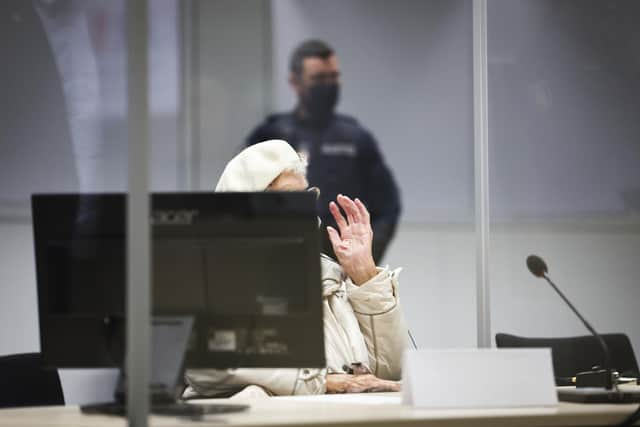Former Nazi camp secretary, aged 97, convicted of complicity in more than 10,500 murders
Irmgard Furchner was accused of being part of the apparatus that helped the camp function.
The Itzehoe state court in northern Germany gave her a two-year suspended sentence, German news agency dpa reported.
Advertisement
Hide AdAdvertisement
Hide AdShe was alleged to have “aided and abetted those in charge of the camp in the systematic killing of those imprisoned there between June 1943 and April 1945 in her function as a stenographer and typist in the camp commandant’s office”.


The verdict and sentence were in line with prosecutors’ demands.
Defence lawyers had asked for her to be acquitted, saying the evidence had not shown beyond doubt Furchner knew about the systematic killings at the camp, meaning there was no proof of intent as required for criminal liability.
In her closing statement, Furchner said she was sorry for what had happened and regretted that she had been at Stutthof at the time.
She was tried in a juvenile court because she was under 21 at the time of the alleged crimes.
The defendant tried to skip the start of her trial in September last year, but was later picked up by police and placed in detention for several days.
It took 40 days for Furchner to break her silence in the trial.
When she did, she told the court "I'm sorry about everything that happened".
Advertisement
Hide AdAdvertisement
Hide AdShe added: "I regret that I was in Stutthof at the time – that's all I can say.”
Prosecutors in Itzehoe said during the proceedings that Furchner’s trial may be the last of its kind.
However, a special federal prosecutors’ office in Ludwigsburg tasked with investigating Nazi-era war crimes says another five cases are pending with prosecutors in various parts of Germany, where charges of murder and accessory to murder are not subject to a statute of limitations.
Initially a collection point for Jews and non-Jewish Poles removed from Danzig, now the Polish city of Gdansk, Stutthof from about 1940 was used as a Nazi so-called “work education camp” where forced laborers, primarily Polish and Soviet citizens, were sent to serve sentences and often died.
From mid-1944, tens of thousands of Jews from ghettos in the Baltics and from Auschwitz filled the camp along with thousands of Polish civilians swept up in the brutal Nazi suppression of the Warsaw uprising.
Some 65,000 people are thought to have died in horrendous conditions at Stutthof, including Jewish prisoners, non-Jewish Poles and captured Soviet soldiers.
The court at Itzehoe in northern Germany heard from survivors of the camp, some of whom have died during the trial.
Camp survivor Josef Salomonovic had travelled to the court to give evidence at the trial. He was only six when his father was shot dead at Stutthof in September 1944.
"She's indirectly guilty, even if she just sat in the office and put her stamp on my father's death certificate,” he told reporters at the court in December last year.